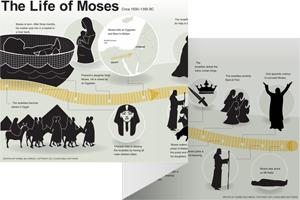99:1–9 This final psalm of Yahweh’s kingship (or enthronement) reflects on Yahweh’s position as ruler of everything, enthroned above the world (see note on 93:1). The picture of Yahweh’s throne fuses elements of heaven and earth; this psalm paints a portrait of Yahweh’s throne that exists simultaneously in heaven and in the Jerusalem temple (vv. 1–5). The psalmist then focuses on Yahweh’s guidance through His servants and His appearances in Israel’s history (vv. 6–7). The psalmist concludes by calling Israel to worship Yahweh at His holy mountain—the temple in Jerusalem (vv. 8–9). |
99:1–3 The psalmist describes how Yahweh, who is powerful and holy, is the ultimate ruler of the whole world. |
99:1 Yahweh is king Emphasizes God’s theocratic rule over the earth. See 93:1 and note.
the peoples See 96:3 and note.
the cherubim This refers to the golden cherubim on the ark of the covenant. See note on 18:10.
99:2 Zion The temple mount in Jerusalem, which is virtually synonymous with Jerusalem itself. From Jerusalem, Yahweh sits as the ruler who is above all rulers and powers of the earth. See note on 20:2.
99:3 name Familiarity with God’s name emphasizes intimate knowledge of Him rather than a particular label. See 91:14 and note.
He is holy Repeated in v. 5 and 99:9. God’s purity of character forms the foundation of holiness. See 93:5 and note.
99:4–5 The psalmist describes Yahweh’s holiness and strength, which is based on His justice—that He brings about equality. |
99:4 the strength of the king loves justice God rules justly and does not rely on power alone. See 94:15 and note.
equity God’s judgment is characterized by fairness and integrity.
justice and righteousness The psalmist uses the justice and righteousness that Yahweh has brought to Israel as support for why everyone should praise Yahweh (v. 3).
Jacob Refers here to the nation of Israel. The patriarch Jacob’s name was changed by God to Israel (see Ge 32:28).
99:5 Exalt Yahweh our God Yahweh is specifically called the God of Israel. This phrase is repeated a total three times (Ps 99:5, 8, 9). See v. 9.
worship The word chawah means “to bow down.” It emphasizes the humility required for true worship. See note on 95:6.
his footstool This refers to the earth in Isa 66:1, the ark of the covenant in 1 Chr 28:2, and Zion (the temple mount) in Lam 2:1. Here, it probably refers to the temple mount in Jerusalem.
99:6–9 Elaborating on the ideas of Ps 99:4, the psalmist describes how Yahweh has proven His character through His faithfulness to Israel and His discipline of Israel when it does wrong. |
99:6 Moses and Aaron Two brothers who played a pivotal role in rescuing Israel from enslavement in Egypt. See Exod 7:1–2.
his priests Refers to someone with the authority to minister before Yahweh in sacred space, such as the tabernacle and temple.
Priests served as mediators between God and the people of Israel; the office was hereditary. Though Moses’ duties didn’t involve regular priestly activity, he served as mediator between God and the people. The priest’s main role in the ot was applying the blood of sacrifices and offering worship to God in the tabernacle and temple. The Levites were responsible for handling the sacred items of God’s tabernacle during transport, and they performed certain duties within the temple after it was built. |
Samuel A prominent leader of Israel during the transition from the time of the Judges into the monarchy. The psalmist may be drawing from the episode of Samuel’s calling in 1 Sam 3.
he answered them Implies a positive response to the faithful person’s call.
99:7 the pillar of cloud During Israel’s time in the wilderness, Yahweh appeared in a pillar of cloud. See Exod 19:9; 40:34–38.
his testimonies Refers to God’s laws and legal provisions.
99:8 forgiving The Hebrew word used here, nasa—which may be literally rendered as “to carry” or “to lift up”—describes how Yahweh removes sin or iniquity.
an avenger The psalmist describes how God is serving justice. See Ps 94:1 and note.
99:9 holy mountain Refers to mount Zion, the temple mount in Jerusalem.
Yahweh our God is holy The psalmist concludes by combining the Hebrew phrases yhwh elohenu (“Yahweh our God”) and hu qadosh (“holy is he”). This acts as a closing proclamation about the character of Yahweh—that He is set apart from everything else.

|
About Faithlife Study BibleFaithlife Study Bible (FSB) is your guide to the ancient world of the Old and New Testaments, with study notes and articles that draw from a wide range of academic research. FSB helps you learn how to think about interpretation methods and issues so that you can gain a deeper understanding of the text. |
| Copyright |
Copyright 2012 Logos Bible Software. |
| Support Info | fsb |
 Loading…
Loading…



 Priests
Priests